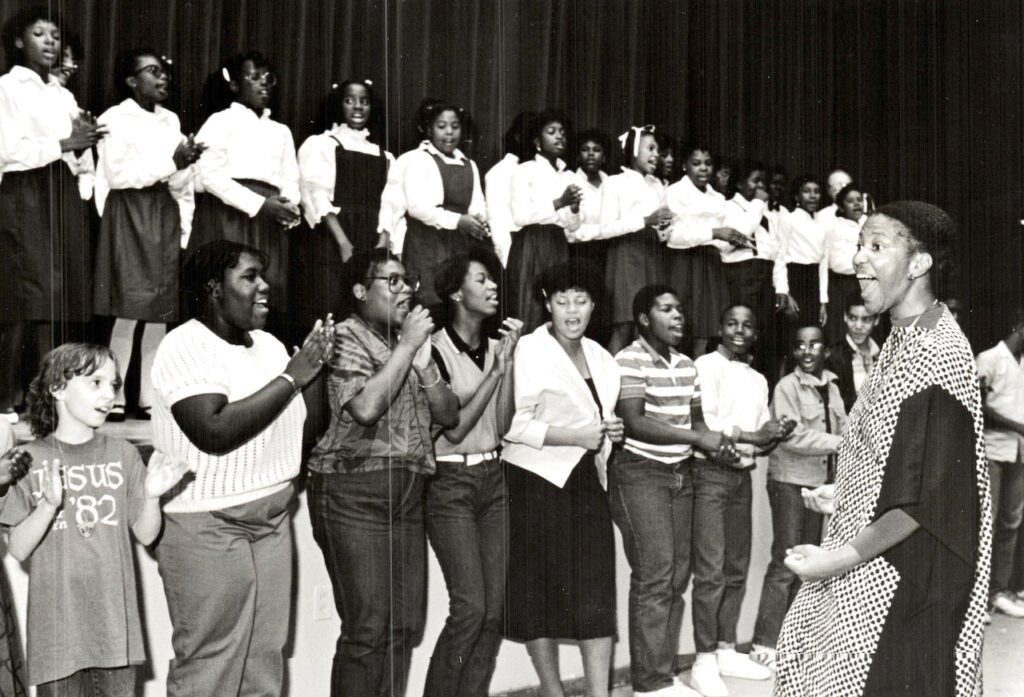Editor’s note: During her travels, Karen Adams had an opportunity to visit Canton, Mississippi, the hometown of Sister Thea Bowman. Karen visited with Sister Bowman’s fellow parishioners and friends and brought home their stories to share.
In a small, one-story school building on a quiet street in Canton, Mississippi, Servant of God Sister Thea Bowman (1937-1990) fell in love with the Catholic faith.
Four Franciscan Sisters of Perpetual Adoration (FSPA) from La Crosse, Wisconsin, ran the Holy Child Jesus Catholic School for Black children, founded in 1946 in the middle of the segregated South during the time of Jim Crow racism. Young Bertha Bowman, as she was known then, was one of those students. She arrived in 1949 after her parents decided the public school system was inadequate.
Born into a Methodist family, she asked to become a Catholic at age nine and entered the Church with the permission of her parents, who later became Catholic as well. Eventually she would join the all-white FSPA order herself – becoming the first black Franciscan nun – and go on to become a renowned teacher, musician, scholar, liturgist and civil-rights activist who would celebrate Black cultural heritage and bring it into the Catholic liturgy.
Now a Servant of God, Sister Bowman might one day be declared a saint; her cause for canonization was opened by the Diocese of Jackson in 2018.
“Sister Thea said it was the kindness of the Franciscan sisters that drew her to the faith as a child,” said Father Guy Wilson, pastor of Holy Child Jesus Catholic Church, which is just a few yards from the old school. “She would see these sisters out in the community, and they would seek out any little children, especially Black children, and talk to them and their families. They were very white, but they loved all children. She said, ‘I knew this was a group I wanted to be with.’”
‘Serious about race’
Born on December 29, 1937, Bertha Bowman was the only child of Dr. Theon Bowman, a family physician, and Mary Esther Bowman, a teacher.
The small, blue house at 136 Hill Street looks much like others in the neighborhood, except for the banner proclaiming “Sainthood for Sister Thea” hanging below one window.
“She and I were just little girls playing together back then,” recalled the Honorable Mamie Chinn, a retired Madison County judge and Sister Bowman’s childhood friend, who lived down the street. “We were simply playmates. She was a playful girl who loved dolls and toys, and I remember Mrs. Bowman would bring out cookies for us children.”
After Bertha joined the FSPA order at age 15 and later became Sister Thea, having changed her name in honor of her father, Theon, Chinn knew her in a different way. “I knew her then as a nun and a mature adult. She was a joyful, happy person in early adulthood but was also very serious about her religion and about issues pertaining to race.”
Like Chinn and many others in Canton, Sister Bowman was dedicated to the cause of civil rights. Although she wasn’t out marching in protest or being thrown in jail as others were, Chinn explained, Sister Bowman championed the movement in her own way according to her position in the Church. “She would teach and speak and tie it all into the values and needs of the African American community,” Chinn said. “She was filled with energy and was very helpful to her people.”
‘Each one teach one’
Sister Bowman earned three degrees in English: a bachelor of arts in 1965 from Viterbo University in La Crosse, which is run by the FSPA; and a master of arts in 1969 and a doctorate in 1972, both from The Catholic University of America, in Washington, D.C. Her doctoral thesis was on St. Thomas More.
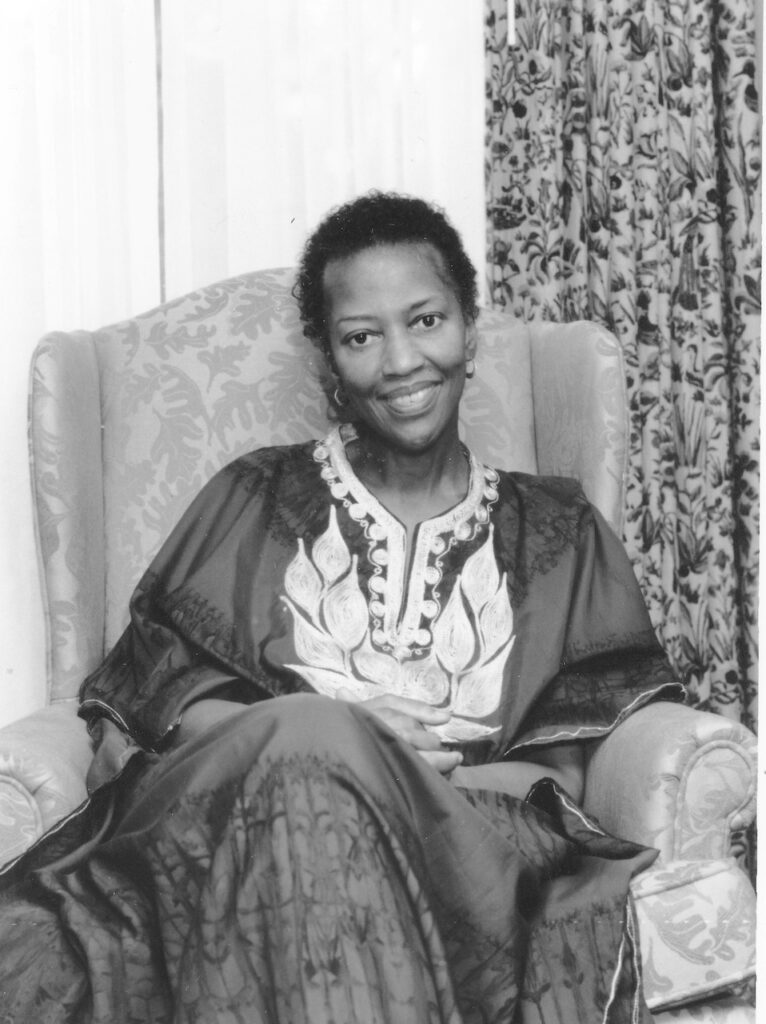
(Photo/Franciscan Sisters of Perpetual Adoration)
She became an educator and after teaching elementary school in La Crosse, returned to Canton, where she taught from 1961-1968. Later she taught at Viterbo, The Catholic University of America, and Xavier University in New Orleans, where she co-founded the Institute for Black Catholic Studies.
One of her famous lines was “Each one teach one.”
When Sister Bowman delivered her stunning, now-famous address to the U.S. Conference of Catholic Bishops in 1989, she opened by singing “Sometimes I Feel Like a Motherless Child” to describe how it felt to be a Black Catholic in the United States.
She also emphasized the need for education in her speech. “Catholic schools have been a primary instrument of evangelization within the Black community,” she said. “The way out of poverty is through education.”
In closing, her voice – still strong despite the cancer that would end her life a year later – brought the mostly white male audience to its feet as they held hands and joined her in singing “We Shall Overcome.”
‘Songs of faith’
The granddaughter of slaves, Sister Bowman once wrote that the gospel songs and spirituals of her Black ancestors were familiar to her in childhood. She would later introduce many of them into the Catholic Church.
“When I was a child in Canton, Mississippi, my people sang the songs of faith,” she is quoted in “Sister Thea: Songs of My People.”
“I learned them from Mama, who sang me to sleep, who sang for me and with me in so many special and well-remembered moments … [and] from all the church folks who sang, played instruments, and danced, or who in their faces reflected the power and beauty of the songs of faith.”
Sister Bowman used her powerful singing voice to convey her faith. She taught singing and piano to many students and instilled an appreciation of Black musical heritage.
While teaching in Canton, one of her voice students was Myrtle Jean Otto, who for many years has helped direct the music program at Holy Child Jesus parish. The minister of music is Greg Williams, whose mother, Anna Marie Williams, was one of Sister Bowman’s piano students.
“We loved her very much, and she wanted the Black Catholics to know that we could sing our traditional Black songs in the church,” said Otto, who now leads the choir and works as assistant minister of music with Williams.
“I learned so much from her about singing and how to organize music for the Mass,” Otto reflected. “But I also learned from her strength, love, and how to have peace within yourself.”
Spirituality ‘flowed out’
Sister Bowman is highlighted at the downtown Canton Multicultural Center and Museum, which pays tribute to local residents who have made contributions to the city. Personal items from her home and life, such as photographs, religious items, and even one of her African-inspired dresses, are on display.
Tour guide Billy Joe Wells is a former reading teacher who taught for several years at Holy Child Jesus Catholic School with Sister Bowman.He also served as her driver during the years when she was back in Canton, and after she became ill. He knew her and her parents well.
“I called her an angel,” he said. “Her spirituality just flowed out of her to everyone around her.”
Wells also recalled how she treated everyone equally and with respect. “She didn’t see skin color, or age, or position in life. She saw everybody the same.”
Sister Bowman’s kindness continues to inspire Sister Mary Anne Poeschl, RSM (Sisters of Mercy), who has been pastoral associate at Holy Child Jesus church for 21 years. She’d heard stories about Sister Bowman stopping to thank people who are often overlooked, such as baggage carriers, janitors, and housekeepers.
“She wanted everyone to be recognized and be seen,” she said. “And because of her, now I try to do that, too. We all need to learn to treat each other as brothers and sisters. That was Thea’s message.”
Servant of God
Father Guy Wilson had met Sister Thea years ago in California and was happy in 2020 to learn he would become pastor of Holy Child Jesus. He knew the history of the place, with a school that was first run in 1946 by priests who were Missionary Servants of the Most Blessed Trinity until the Franciscan sisters arrived in 1948.
“What struck Sister Thea so strongly was not only that this group of white sisters and brothers and priests made their home in the African American community, but that Black and white were so good at coming together for education and worship, and also for social justice,” he said. “She saw this as the heart and soul of Jesus’ mission in her own time which now hits our times in various ways.”
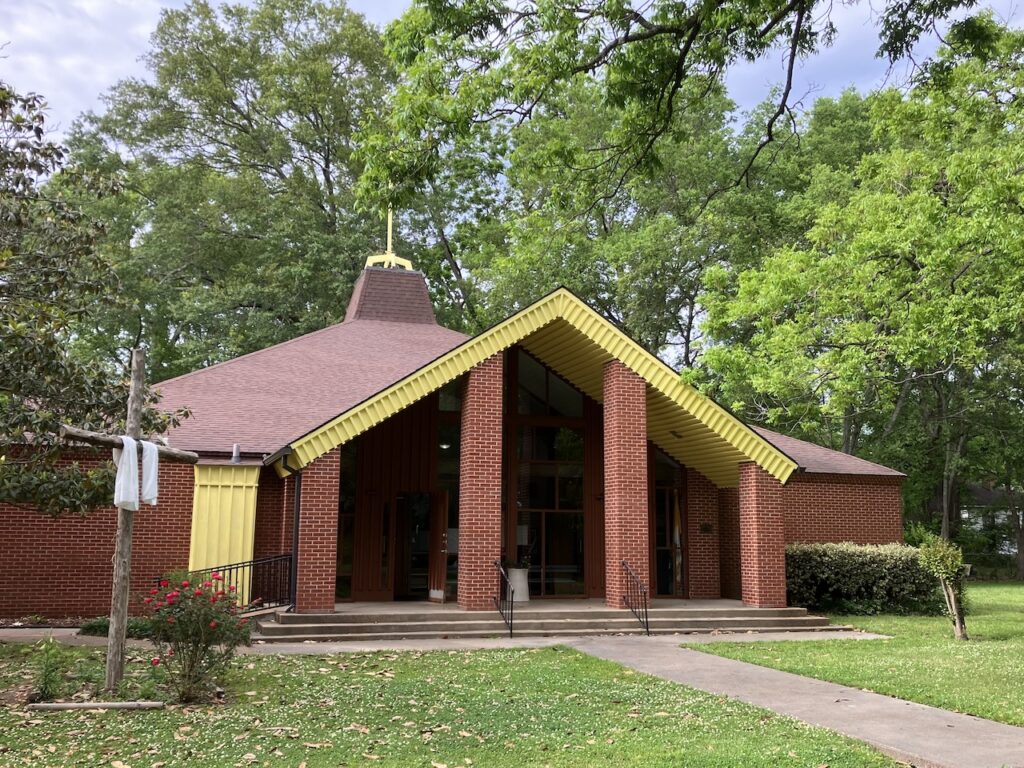
Sister Bowman’s cause for canonization was opened in November 2018. Her body will one day be moved from the Memphis cemetery where she rests with her parents to the grounds of Holy Child Jesus Church.
“She was an extraordinarily holy woman, yet ordinary, too,” recalled Father Maurice Nutt, who was her final student at Xavier’s Institute for Black Catholic Studies and who is a consultant to the Diocese of Jackson on Sister Bowman’s cause for canonization. “You knew God was with her; she had a profound wisdom about her.”
“She promoted peace, awareness and a deeper understanding among various cultures,” he said. “She is an apostle for racial reconciliation.”
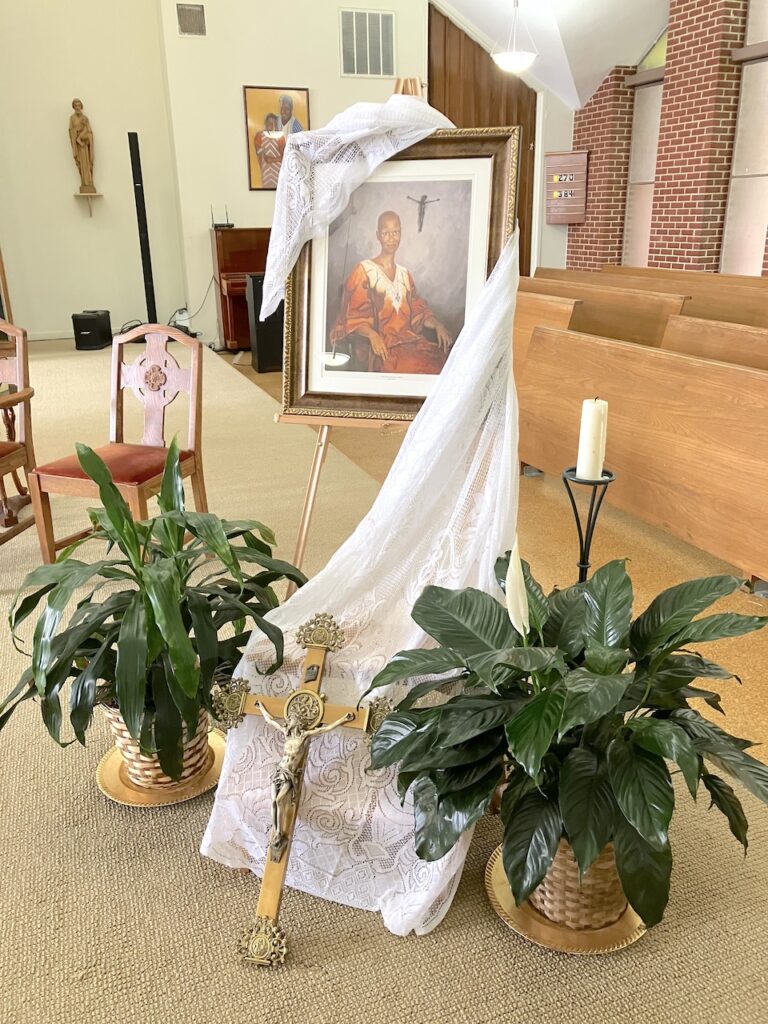
The life of Thea Bowman is celebrated in books, videos, films and even a play, “Thea’s Turn,” by Canton native and white playwright Mary Queen Donnelly, who grew up across town and attended a different parish.
Nearly 33 years after Sister Bowman’s death, the old chapel where she prayed is gone, having been replaced in 1967 by the brick church that today is home to 57 parishioners. The school where she learned from the Franciscan nuns is now a privately owned preschool.
Her spirit is still present, however. The chapel cross before which she prayed is on display near the altar in Holy Child Jesus church, next to a portrait of her in her bright yellow African clothes. Her influence and good example are still alive in the people there: in their songs, prayers, and spirit of love.
“I thank God for letting her be in my life and be my teacher,” said Otto. “She showed me the way to God.”
‘Powerful presence of Christ’: memories from southwestern Virginia
It’s been nearly four decades since Sister Thea Bowman visited southwestern Virginia, but her impression remains.
Although seriously ill at the time, she spoke at Our Lady of Nazareth (OLN), Roanoke, in 1984. Even while battling breast cancer, she continued traveling and speaking as much as possible.
“I remember mostly her powerful presence as I sat in the front row, right in front of her,” said OLN parishioner Katie Zawacki, who attended the presentation with her husband, John.
She not only spoke but sang, Zawacki recalled. “What I best remember her singing is ‘I don’t believe He brought me this far to leave me’ [from ‘I Don’t Feel No Ways Tired’ by gospel singer James Cleveland]. As she sang, I cried my eyes out. She convinced me God would be with me and our parish, as we were in a time of transition.”
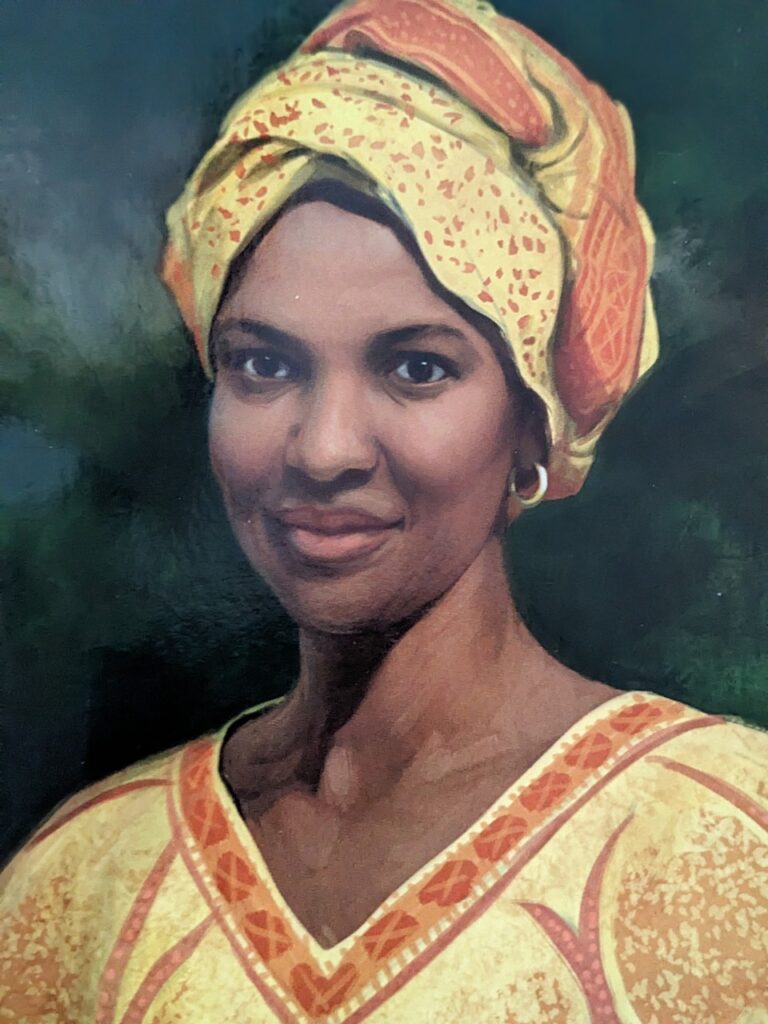
Zawacki explained that OLN’s beloved pastor, Msgr. Tom Caroluzza, had just left on sabbatical and she was heartbroken to see him go. “Sister Thea provided strength and assurance,” she said, adding that they had just learned of Sister Bowman’s cancer diagnosis. “Despite the cancer, she was such a strong presence, with her voice and her African clothing. She gave us all she had.”
Sister Bowman’s encouraging words have stayed with the Zawackis to this day, guiding them later to help found two multicultural social justice organizations in Roanoke: Voices of Faith and Points of Diversity.
“I’ll always remember her strong message of faith,” Zawacki said.
Lynne Lonnquist, formerly of Roanoke, also heard Sister Bowman speak and sing that evening. “I do know she touched a part of me I was not aware of,” recalled Lonnquist, who, with her husband, Dan, also spoke with Sister Bowman afterward. “What sticks with me to this day are both her simplicity in speech and dress, and her call to action.”
Now-retired Msgr. Walter Barrett, former pastor of St. Gerard, Roanoke, hosted Sister Bowman at his rectory after her speech in Roanoke.
“When she returned from OLN that night, she was emotionally and physically drained,” Msgr. Barrett remembered. “She greeted me and went to bed because the cancer was taking its toll, I suspect. The next morning, she left early to return home. I recall it was a pleasant visit, and later I saw her on TV addressing the American bishops and on ‘60 Minutes.’”
Although Msgr. Barrett did not attend her presentation, the Franciscan nun from Mississippi left an impression on him nonetheless.
“I think her intercession will bring about greater conversions of many African Americans into the practice of our holy Catholic faith at this time in history,” he reflected.
“This is my hope and prayer as a Christian who is Catholic and as a retired priest of the Diocese of Richmond. I think she will also bring about through her intercession greater appreciation of the role women play on all levels in the practice of the faith, going all the way back to the influential women in the life of Christ, beginning with his mother, Mary.”
Sue Ellerbrock, director of religious education at St. Mary, Blacksburg, and St. Jude, Radford, heard Sister Bowman speak not in Virginia but in Florida. She attended the presentation with her husband, Mike, a deacon at St. Mary, St. Jude, Catholic Campus Ministry at Virginia Tech, and OLN.
“We saw Sister Thea in Florida in the early 1980s and her speech was quite inspiring,” Ellerbrock recalled, adding that it left an impression that remains nearly 40 years later.
“We remember the feeling of overall joy, peace, and love from her. She had a powerful presence of Christ.”
See Sister Bowman’s famous 1989 address to the U.S. Conference of Catholic Bishops.

